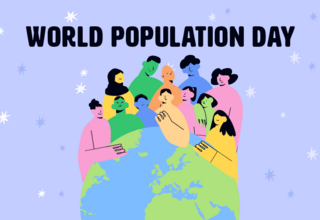The COVID-19 pandemic may have lasting consequences on the world population. During the pandemic, disruptions in accessing reproductive health services and family planning methods, especially in countries where healthcare systems are inadequate, have resulted in significant changes in birth rates. For some, it has led some to postpone childbearing. For others, disruptions in health care have led to unintended pregnancies. Many countries in Europe including Turkey have faced a sharp decline in the number of births, over 10 per cent. The United Nations Population Fund, UNFPA, determines the theme of World Population Day 2021 as: "Rights and Choices are the Answer: Whether baby boom or bust, the solution to changing fertility rates lies in prioritizing reproductive health and rights for all.”
ANKARA, TURKEY - The ongoing COVID-19 pandemic has exposed weaknesses in healthcare systems globally and has caused serious gaps and challenges in the provision of sexual and reproductive health information and services for women and girls. At the same time, COVID-19 has exacerbated gender inequalities and gender-based violence, with increased incidences under lockdowns. There are also signs that harmful practices such as child marriage and female genital mutilation are increasing as programmes to address them have been interrupted.
Against this backdrop, concern over changing fertility rates, which in some places seem to be accelerating due to the pandemic, has grown. Earlier analyses of existing data -- largely from high-income countries -- indicated that COVID-19 may be accelerating fertility decline in some countries, including in some European countries and the United States, as couples respond to the crisis by delaying pregnancy or changing fertility plans.
The pandemic and its impact on people’s reproductive choices hit when fertility rates were already very low across Europe. Statistics from late 2020 — nine months after the first lockdowns kicked in — show a sharp decline in the number of births, over 10 per cent on average in European countries for which data is available. Turkey is one of these countries.
With a population of 83.4 million people, Turkey’s fertility rate remained below the population's replacement level of 2.10. According to Turkstat’s latest statement on Tuesday, while the total fertility rate in 2001 was 2.38 children in Turkey, it was 1.76 children in 2020. This rate was 1,88 in 2019.
On the other hand, data and projections have also suggested that, in some low- and middle-income countries, the pandemic has interrupted access to family planning services, increasing unintended pregnancies among vulnerable groups. For instance, spikes in unintended pregnancy were seen among adolescents in Kenya and Malawi.
Considering all these, the United Nations Population Fund, UNFPA, determines the theme of World Population Day 2021 as: "Rights and Choices are the Answer: Whether baby boom or bust, the solution to changing fertility rates lies in prioritizing reproductive health and rights for all.”
Although we have yet to get a full picture of the impact of COVID-19 on fertility, these trends lead to concerns about baby booms or busts and these concerns have provoked alarmism. But alarmist policy responses can prove extremely harmful if they undermine individual health, rights and choices.
Alarmist approaches, in some cases, have led to retrogressive measures such as reducing access to legal abortion, and/or restrictions on contraception. In places with rising populations, harmful policy responses to reduce fertility rates have included coercive family planning and sterilization.
UNFPA calls for policymakers to respond to fertility and demographic shifts by prioritizing the sexual and reproductive health and rights of all people, including through their access to sexual and reproductive health information and services.
Given that even before the pandemic, only 55 per cent of women, in countries with data, reported being able to make their own decisions about accessing health care, using contraception or engaging in sex with their partner, it is important that health systems should be supported to deliver sexual and reproductive health services during crises, including by classifying this work as essential. Women must be empowered educationally, economically and politically in order to exercise unencumbered choice over their bodies and fertility.
On World Population Day, UNFPA repeats its call to raise awareness about the sexual and reproductive health needs and vulnerabilities of women and girls, to highlight how safeguarding rights and choices are the best solutions to shifting demographics, and ensure that sexual and reproductive health and rights and bodily autonomy stays on the local agenda as we look towards 2030.
UNFPA Executive Director Natalie Kanem states the following: “Sexual and reproductive health services are essential. Even if health systems are understandably strained, these services cannot wait. Any further delays will curtail the health and well-being of women and girls, with consequences that can last a lifetime. Let us work together for the rights and choices of all women and girls.”
Ultimately, the best way to address fertility change is to support the human rights and welfare of all people. UNFPA has been working to enable reproductive rights and choices everywhere and remains critical to the success of all people, no matter where they live.



